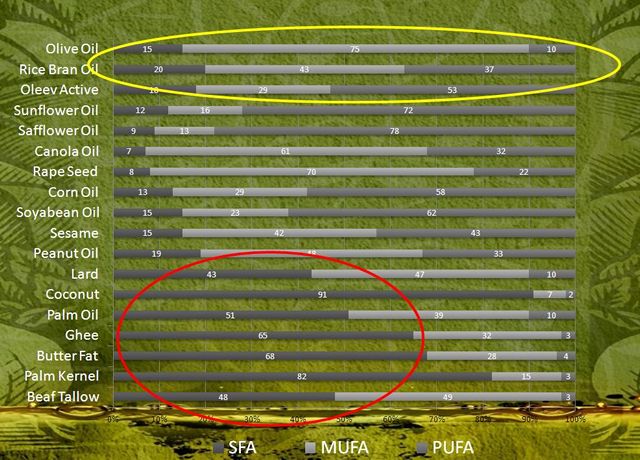
There is a reason that Protein, carbohydrates and fats are considered macromolecules because all three are considered essential to humans. No fat diet or low fat diet rarely work as the body then starts working against oneself.
As fats are essential to the body, in its absence, the fat reserves in the body are used up. Taking healthy fat in proper ratio actually helps aid in weight loss. Healthy fats like olive oil will stimulate bile flow to improve digestion and breakdown fats properly. Good fats also contain HDL cholesterol (good cholesterol) that circulates through the body and helps get rid of plaque deposits on blood vessels.
Vitamins and minerals also are important in diet. Fat soluble vitamins use oils and fats in our daily foods for transportation to target organs. Without these good fats to carry and store certain vitamins, nutritional deficiencies may occur. Fat soluble vitamins are A, D, E and K. Also such essential nutrients are found in fats such as omega three and omega six fats.
Quality ways of getting healthy and quality fats are through olive oil, flax seed, and fish oil.
It is always important to keep the fats in diets in a good ratio. Fat is a long term source of energy so higher ratios can be used for atheletes. Non hydrogenated oils, non trans fats and non saturated fats should be focused upon in the diet to keep lipid intake in limit and limit to essential and quality fats.

• The diet of Asian cultures is normally low in fat and high in unrefined carbohydrate.
• The Asian diet contains very little dairy products, even low-fat or non-fat choices, leaving no other options for calcium.
• The Indian diet is largely vegetarian and incorporates vegetables and fruits; dairy products, such as yogurt and butter; pulses such as chickpeas and lentils; rices; flat breads are made from whole grains or bean flour and a variety of nuts and seeds.
• Eastern Asia, namely China, Japan, Korea, and Thailand consume incorporate steamed, sauteed or raw vegetables and small portions of sauteed, grilled or fried meats, seafood, eggs and tofu. Meals usually contain rice or noodles in place of breads.
• Asian food often serves as both nourishment and medicine. The cuisines tend to focus on a balance between salty, sweet, sour and spicy flavors, as well as crunchy and soft textures.
• Asians tend to favor strong flavors, rich sauces and infused oils to dress their foods.
• Its apex health benefit promising reduction in risk of heart disease has earned the diet a place in many households.
• The eating style consists of an emphasis on whole grain carbohydrates (pasta, rice, cereals rather than refined sugar and processed carbohydrates like baked goods, snacks, etc.), plenty of fresh fruits such as pomegranates, grapes, citrus and figs and vegetables such as tomatoes, zucchini, olives, eggplant and squash, olive oil as the main source of fat, fish and poultry in moderation, and a limited amount of red meat.
• The Mediterranean diet favors simple meals with earthy, light flavors. The focus is on fresh, whole foods with minimal preparation. Fish, meats and vegetables are typically dressed and cooked in olive oil and garlic and herbs are used to add flavor, rather than salt or heavy sauces.
Welcome to the world of Oleev, where you embark on a journey that takes you beyond the ordinary. At Oleev, our products don’t just fulfill your needs…

